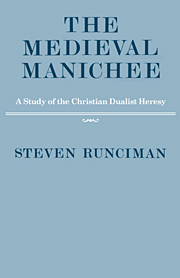Book contents
- Frontmatter
- Contents
- CHAPTER I Introduction
- CHAPTER II The Gnostic Background
- CHAPTER III The Paulicians
- CHAPTER IV The Bogomils
- CHAPTER V The Patarenes
- CHAPTER VI The Cathars
- CHAPTER VII The Dualist Tradition
- APPENDIX I The Greek Sources for Paulician history
- APPENDIX II Heretical Movements in the Eighth Century
- APPENDIX III Various Names given to the Dualist Heretics in Europe
- APPENDIX IV Dualism, Buddhism and Occultism
- BIBLIOGRAPHY
- ADDITIONS (1982)
- INDEX
CHAPTER VII - The Dualist Tradition
- Frontmatter
- Contents
- CHAPTER I Introduction
- CHAPTER II The Gnostic Background
- CHAPTER III The Paulicians
- CHAPTER IV The Bogomils
- CHAPTER V The Patarenes
- CHAPTER VI The Cathars
- CHAPTER VII The Dualist Tradition
- APPENDIX I The Greek Sources for Paulician history
- APPENDIX II Heretical Movements in the Eighth Century
- APPENDIX III Various Names given to the Dualist Heretics in Europe
- APPENDIX IV Dualism, Buddhism and Occultism
- BIBLIOGRAPHY
- ADDITIONS (1982)
- INDEX
Summary
SO it was that one great confederate Dualist Church arose, stretching from the Black Sea to Biscay. In all the countries into which it spread, its successes were made sure by political conditions, by circumstances of racial politics, of class politics and of personal politics. But for the social condition of the peasants of Bulgaria, but for the diplomatic condition of Bosnia, midway between Eastern and Western Christendom, and but for the rapacity of certain great nobles of Languedoc, stimulated by the vulnerability of an inadequate Catholic hierarchy, the Dualists might have remained in obscurity. But the political impulse was not everything. Behind it there was a steady spiritual teaching, a definite religion, that developed and declined as most religions do, but that embodied a constant Tradition.
What was this Tradition? Where and when did it begin? Its birth lies far back in the days when man first consciously looked at the world and saw that it was bad; and he wondered how such evil should be, and why God, if there be a God, could permit it, “The earth is given into the hand of the wicked”, cried Job: “He covereth the faces of the judges thereof; if not, where and who is He?” This is the problem behind the Tradition, a problem that every religious thinker must face and few can solve. At times it might be ignored. The Jews in the days of their prosperity, complacent at being the Chosen People, or the Greeks of the fifth century b.c., in love with the world around them, might forget its wickedness or despise the cause of it.
- Type
- Chapter
- Information
- The Medieval ManicheeA Study of the Christian Dualist Heresy, pp. 171 - 180Publisher: Cambridge University PressPrint publication year: 1982



